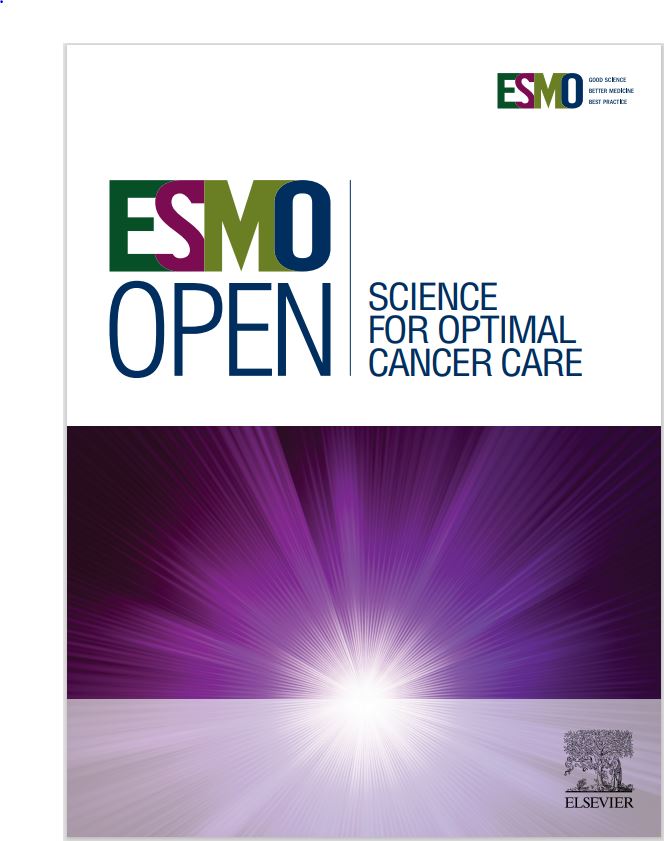Pembrolizumab with trastuzumab and chemotherapy for HER2-positive advanced gastric cancer: health-related quality-of-life analysis from the randomized KEYNOTE-811 trial
IF 8.3
2区 医学
Q1 ONCOLOGY
引用次数: 0
Abstract
Background
In the primary analysis of the randomized phase III KEYNOTE-811 trial (NCT03615326), pembrolizumab plus trastuzumab and chemotherapy improved progression-free survival and overall survival versus placebo plus trastuzumab and chemotherapy in participants with previously untreated human epidermal growth factor receptor 2 (HER2)-positive advanced gastric cancer.
Patients and methods
Overall, 698 participants were randomly assigned (1 : 1) to pembrolizumab 200 mg or placebo every 3 weeks, both with trastuzumab and chemotherapy. We report prespecified exploratory patient-reported outcomes (PROs), including change from baseline, time to deterioration (TTD), and overall improvement/stability rate assessed in European Organization for Research and Treatment of Cancer Quality of Life Questionnaire-Core 30 (EORTC QLQ-C30) scales/items, EORTC Quality of Life Questionnaire-Stomach 22 pain scale, and EuroQoL 5-dimension 5-level questionnaire visual analog scale.
Results
The PRO population comprised 685 participants. At baseline, the rates of compliance and completion for all PRO questionnaires and for both treatment groups were >92%; at week 24, the rates were >80% and >55%, respectively. No between-group differences were observed from baseline to week 24 for the QLQ-C30 global health status/quality of life (GHS/QoL) scale [least squares mean (LSM) difference −1.16; 95% confidence interval (CI) −4.23 to 1.91] and EQ VAS (LSM difference, −0.69; 95% CI −3.06 to 1.68). Median TTD was not reached. A similar proportion of participants in each treatment group had improved and/or stable scores in the QLQ-C30 GHS/QoL scale (pembrolizumab group 71.9%; placebo group 71.5%). Findings were similar for all other prespecified scales/items.
Conclusions
While improving clinical outcomes, the addition of pembrolizumab to trastuzumab and chemotherapy did not negatively impact health-related quality of life during treatment, supporting the use of pembrolizumab plus trastuzumab and chemotherapy for first-line treatment of HER2-positive advanced gastric cancer.
派姆单抗联合曲妥珠单抗和化疗治疗her2阳性晚期胃癌:来自随机KEYNOTE-811试验的健康相关生活质量分析
背景:在随机III期KEYNOTE-811试验(NCT03615326)的初步分析中,派姆单抗联合曲妥珠单抗和化疗改善了先前未经治疗的人类表皮生长因子受体2 (HER2)阳性晚期胃癌患者的无进展生存期和总生存期,而安慰剂联合曲妥珠单抗和化疗改善了患者的无进展生存期和总生存期。患者和方法:总体而言,698名参与者被随机分配(1:1),每3周接受200 mg派姆单抗或安慰剂治疗,同时接受曲妥珠单抗和化疗。我们报告了预先指定的探查性患者报告的结果(PROs),包括基线变化、恶化时间(TTD)和总体改善/稳定率,评估方法为欧洲癌症研究与治疗组织生活质量问卷- core 30 (EORTC QLQ-C30)量表/项目、EORTC生活质量问卷-胃疼痛量表和EuroQoL 5维5级问卷视觉模拟量表。结果:PRO人群包括685名参与者。在基线时,所有PRO问卷和两个治疗组的依从率和完成率均为0.92%;第24周,两组分别为80%和55%。从基线到第24周,QLQ-C30整体健康状况/生活质量(GHS/QoL)量表组间无差异[最小二乘平均(LSM)差-1.16;95%可信区间(CI) -4.23 ~ 1.91]和EQ VAS (LSM差异为-0.69;95% CI为-3.06 ~ 1.68)。中位TTD未达到。每个治疗组中有相似比例的受试者在QLQ-C30 GHS/QoL量表中获得改善和/或稳定评分(派姆单抗组71.9%;安慰剂组71.5%)。所有其他预先指定的量表/项目的调查结果相似。结论:在改善临床结果的同时,派姆单抗联合曲妥珠单抗和化疗对治疗期间健康相关生活质量没有负面影响,支持派姆单抗联合曲妥珠单抗和化疗用于her2阳性晚期胃癌的一线治疗。
本文章由计算机程序翻译,如有差异,请以英文原文为准。
求助全文
约1分钟内获得全文
求助全文
来源期刊

ESMO Open
Medicine-Oncology
CiteScore
11.70
自引率
2.70%
发文量
255
审稿时长
10 weeks
期刊介绍:
ESMO Open is the online-only, open access journal of the European Society for Medical Oncology (ESMO). It is a peer-reviewed publication dedicated to sharing high-quality medical research and educational materials from various fields of oncology. The journal specifically focuses on showcasing innovative clinical and translational cancer research.
ESMO Open aims to publish a wide range of research articles covering all aspects of oncology, including experimental studies, translational research, diagnostic advancements, and therapeutic approaches. The content of the journal includes original research articles, insightful reviews, thought-provoking editorials, and correspondence. Moreover, the journal warmly welcomes the submission of phase I trials and meta-analyses. It also showcases reviews from significant ESMO conferences and meetings, as well as publishes important position statements on behalf of ESMO.
Overall, ESMO Open offers a platform for scientists, clinicians, and researchers in the field of oncology to share their valuable insights and contribute to advancing the understanding and treatment of cancer. The journal serves as a source of up-to-date information and fosters collaboration within the oncology community.
 求助内容:
求助内容: 应助结果提醒方式:
应助结果提醒方式:


